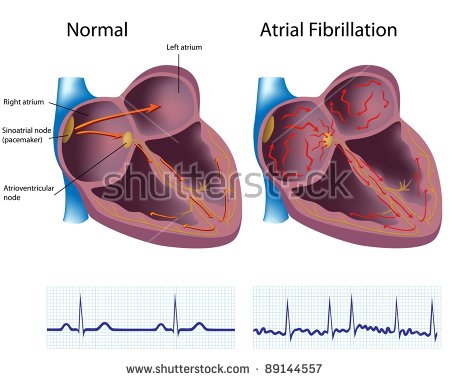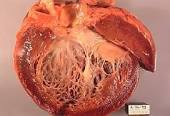
Diagnosed with Cancer? Your two greatest challenges are understanding cancer and understanding possible side effects from chemo and radiation. Knowledge is Power!
Learn about conventional, complementary, and integrative therapies.
Dealing with treatment side effects? Learn about evidence-based therapies to alleviate your symptoms.
Click the orange button to the right to learn more.
- You are here:
- Home »
- Blog »
- side effects ID and prevention »
- Atrial Fibrillation with Antioxidants
Atrial Fibrillation with Antioxidants

I manage my atrial fibrillation with antioxidants. Not exclusively antioxidants but nutrition and supplementation are the foundation for my AF care day-in, day-out.
I am a long-term cancer survivor. I underwent many different types of cardio toxic chemotherapy regimens including:
- Melphalan
- Busulphan
- Cytoxan
- Adriamycin
Cardio-oncology was not a thing when I underwent conventional cancer treatments in 1995 so I’ll never be sure how badly my heart was damaged by my treatments. But many different studies document the type of therapies and the type of damage they cause. So I’m pretty sure.
Which brings us to the topic of this post- atrial fibrillation aka AF aka Afib.
What are some non-conventional therapies to manage atrial fibrillation?
. Acupuncture
- Overview: Acupuncture, a traditional Chinese medicine technique, involves inserting thin needles into specific points on the body.
- Evidence: Some studies suggest that acupuncture may help reduce the frequency of AFib episodes and improve heart rate variability by modulating the autonomic nervous system.
2. Yoga and Meditation
- Overview: Yoga combines physical postures, breathing exercises, and meditation.
- Evidence: Research has shown that yoga can reduce AFib symptom burden, decrease heart rate, and improve quality of life. Stress reduction through meditation may also help manage AFib.
3. Tai Chi
- Overview: Tai Chi is a mind-body practice that involves slow, deliberate movements, meditation, and deep breathing.
- Evidence: Tai Chi can reduce stress and improve cardiovascular health, which may be beneficial for AFib patients.
4. Nutritional Supplements
- Overview: Certain supplements may support heart health.
- Evidence: Supplements like omega-3 fatty acids, magnesium, and Coenzyme Q10 (CoQ10) have been studied for their potential to reduce AFib episodes and improve heart function. However, more research is needed, and these should be used under medical supervision.
5. Herbal Medicine
- Overview: Various herbs are traditionally used for cardiovascular health.
- Evidence: Herbs like Hawthorn, Motherwort, and Astragalus have been explored for their heart benefits. It’s crucial to consult a healthcare provider before using herbal remedies, as they can interact with conventional medications.
6. Mind-Body Therapies
- Overview: Techniques like biofeedback and guided imagery focus on the connection between the mind and body.
- Evidence: These therapies can reduce stress and improve heart rate variability, potentially aiding in AFib management.
7. Electroacupuncture
- Overview: This involves the application of a small electrical current to acupuncture needles.
- Evidence: Some studies indicate it might help in reducing the recurrence of AFib by modulating the autonomic nervous system.
8. Exercise and Physical Activity
- Overview: Regular, moderate exercise can improve cardiovascular health.
- Evidence: While intense exercise may trigger AFib in some individuals, moderate exercise has been shown to reduce AFib episodes and improve overall heart health.
9. Dietary Changes
- Overview: A heart-healthy diet rich in fruits, vegetables, whole grains, and lean proteins.
- Evidence: The Mediterranean diet, in particular, has been associated with a lower incidence of AFib.
10. Stress Management Techniques
- Overview: Techniques such as deep breathing exercises, progressive muscle relaxation, and mindfulness.
- Evidence: Stress is a known trigger for AFib episodes, and effective stress management can help reduce the frequency and severity of episodes.
Important Considerations
- Consultation: Always discuss with a healthcare provider before starting any non-conventional therapy.
- Integration: These therapies should complement, not replace, conventional treatments.
- Personalization: The effectiveness of non-conventional therapies can vary; what works for one person may not work for another.
I am not a cardiologist. I am not any sort of medical professional. I am a cancer survivor who developed chronic (24/7) AF in 2010 who has been managing his atrial fibrillation with antioxidants, acupuncture, moderate exercise, nutrition, etc.- more than 15 years as of today.
I think it is important for cancer survivors who have developed chemotherapy-induced cardiomyopathy to explain to other cancer survivors who may also have chemotherapy-induced cardiomyopathy that there may be evidence-based either/or complementary or alternative therapy plans to manage their AF.
To be clear, conventional therapies for AF can be expensive and come with serious side effects- and often don’t work. Conversely, managing your atrial fibrillation with antioxidants is, at the very least, a fairly safe therapy plan.
Are you a cancer survivor living with AF? Or perhaps you underwent cardio-toxic chemo and you are wondering about AF in your future?
If you’d like to learn more about any of the therapies- above or below- email me at David.PeopleBeatingCancer@gmail.com
Hang in there,
David Emerson
- Cancer Survivor
- Cancer Coach
- Director PeopleBeatingCancer
A comprehensive insight of novel antioxidant therapies for atrial fibrillation management.
Atrial fibrillation (AF) is the most common arrhythmia in clinical practice and is associated with decreased quality of life, and increased mortality and morbidity from stroke and thromboembolism. The underlying mechanisms involved in the development of AF have yet to be fully elucidated.
However, once initiated, AF tends to self-perpetuate, due to structural and electrical remodeling in the atria. Currently, therapies for AF, such as, antiarrhythmic drugs and catheter ablation, have significant limitations.
- Antiarrhythmic drugs target one or a few cardiomyocyte ion channels and have considerable pro-arrhythmic and non-cardiac adverse effects.
- On the other hand, catheter ablation is an expensive treatment associated with measurable complications and its long-term success in management of AF is controversial.
- Current consensus guidelines recommend β-blockers, amiodarone, digitalis glycosides and non-dihydropyridine calcium channel antagonists or a combination of them for AF treatment, but bradycardia and heart block may occur as an unwanted effect.
On the other hand, antioxidant agents have recently attracted much interest in AF treatment because they have been associated with a reduction in lone AF and post-operative AF, and in some cases, with a decrease in long-term hospitalization time.
Moreover, antioxidants can be considered a cheap treatment with reduced side effects. In this review, we will comprehensively review the effects and the mechanisms of action of several antioxidant agents, such as
- vitamin E,
- ascorbic acid,
- carotenoids,
- statins,
- omega-3 polyunsaturated fatty acids and
- N-acetylcysteine.”


